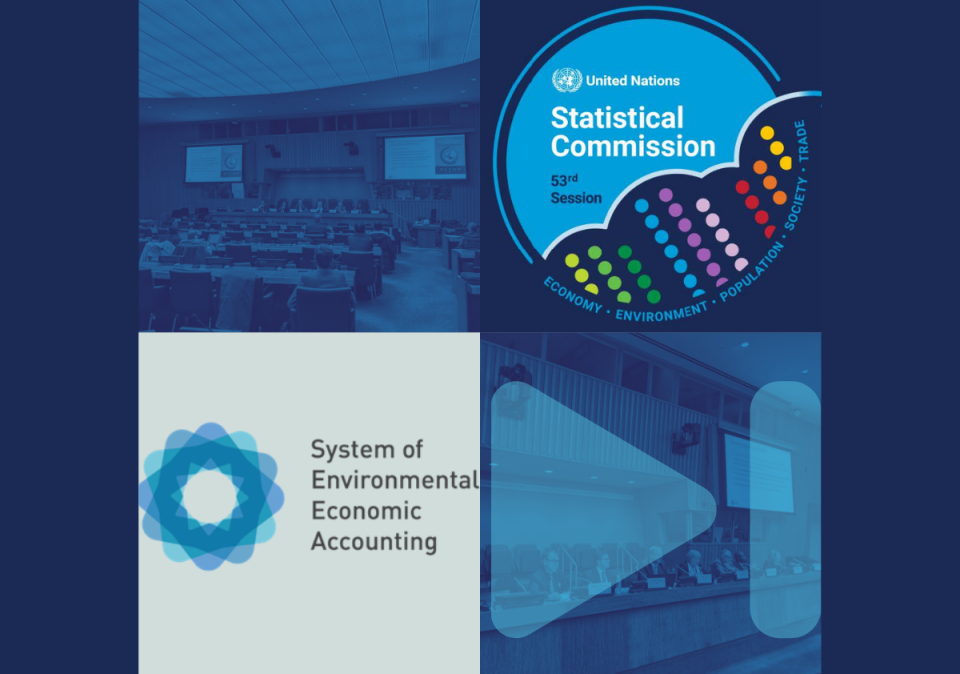SEEA Highlights of the 53rd UN Statistical Commission

The 53rd session of the United Nations Statistical Commission (UNSC) took place virtually from 28 February – 2 March and 4 March 2022, giving the United Nations Committee of Experts on Environmental-Economic Accounting (UNCEEA) an opportunity to present their work programme for the next four years.
The Commission welcomed the proposed programme of work of the Committee. One of the key focuses of the session was the Implementation Strategy for the SEEA Ecosystem Accounting. Drafted by the Technical Committee on the SEEA Ecosystem Accounting (EA), the Implementation Strategy provides a global strategy for increasing implementation of the SEEA EA. It advocates a flexible and modular approach, multi-stakeholder engagement, South-South collaboration and more. It also sets ambitious targets for implementation of at least 60 countries implementing the SEEA EA by 2025, i.e. an addition of 24 countries to the 36 countries currently compiling the SEEA EA. Thus, supporting countries on SEEA EA implementation will be a major focus of the UNCEEA over the next several years.
Another highlight was the UNSC’s commendation on the close involvement of the Committee in the SNA update process and the updates of the International Standard Industry Classification (ISIC) and Central Product Classification (CPC). With regards to the SNA update process, the Committee is actively working with the Advisory Expert Group on National Accounts and the Intersecretariat Working Group on National Accounts on the SNA update process, making sure that the updated SNA takes into account the SEEA in relevant environmental issues. With regards to revisions of classifications, the UNSC also noted the importance of the Committee’s work. In particular, the Committee is actively involved in the revisions of ISIC and CPC to ensure that the updated classifications are fit for purpose for SEEA compilation and sufficiently forward looking in scope. Importantly, the UNSC also requested the revision of the Standard International Energy Product Classification (SIEC) to improve harmonization between SIEC and CPC, which currently have a limited level of correspondence. The Committee plans to actively engage in this effort, as it could help harmonize physical and monetary energy accounts which usually use SIEC and CPC, respectively.
The use of the SEEA for policies on biodiversity, climate change and sustainable tourism were also highlighted by the UNSC. The UNSC strongly supported the Committee’s work in ensuring that the SEEA is used for the compilation of several headline indicators of the monitoring framework of the post-2020 global biodiversity framework, expected to be adopted at COP-15 in fall 2022. Similarly, the UNSC welcomed the involvement of the Committee in the proposal for a new G20 Data Gaps Initiative, whereby energy, air emission and environmental activity accounts will be used to fill significant climate change data gaps. In addition, the UNSC also encouraged the finalization Statistical Framework for Measuring the Sustainability of Tourism (SF-MST), which will be reviewed by the UNCEEA prior to its submission to the UNWTO Committee on Statistics and UNSC.
For more on the above areas of work and other key components of the UNCEEA’s work programme, such as capacity building and business accounting, please see the following:
- To access the draft decisions (subject to editing) of the 53rd session of the UNSC, please see here: https://unstats.un.org/unsd/statcom/53rd-session/resources/Annex%20III%20-%20Draft%20decisions.pdf
- The recording of the sessions can be found here: https://unstats.un.org/unsd/statcom/53rd-session/webcast/
- The report of the Committee to the UNSC can be found here: https://digitallibrary.un.org/record/3954789?ln=en
